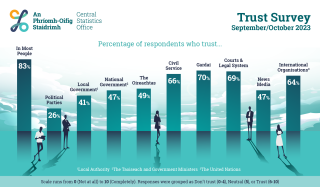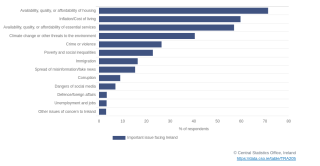Trust and the need for a new Social Contract

Trust is an invisible thread woven through the fabric of society. Trust influences everything from personal relationships to global economies. We live in a society that is experiencing rapid advancements in technology, shifting political landscapes, and unprecedented global challenges. As a result, trust has become an increasingly precious commodity. Whether it's trust in our institutions, the media, corporations and businesses or interpersonal relationships, understanding the nuances of trust is crucial for navigating the complexities of modern life. This latest trust survey provides a comprehensive analysis of where trust stands today, offering valuable insights into the factors that influence it and the implications for our social fabric and the future of our interconnected world. Understanding where and how trust is built —and where it is eroded—has never been more crucial.
The Organisation for Economic Co-operation and Development’s (OECD) conducted a second round of the 'Trust Survey' in 2023, the first round taking place in 2021. The survey collects respondents self-reported interpersonal trust and trust in different institutions and levels of government across OECD countries. Ireland was one of 30 countries that participated in the 2023 round of the survey. The Central Statistics Office has published the results of the Ireland survey.
Key Findings in Ireland
-
More than eight in ten respondents (83 per cent, up from 78 per cent in 2021) reported they trusted most people. This was the highest level of trust when compared with other categories such as government organisations or the news media.
-
Political parties had the lowest levels of trust with approximately one in four people reporting they trusted political parties.
-
Seven in ten respondents reported they trust in the Gardaí.
-
Close to half of respondents (47 per cent) reported they trusted the news media.
-
Approximately half of respondents reported they would be very comfortable asking a neighbour to keep a set of keys to their home for emergencies.
-
More than nine in ten respondents believed that a lost wallet or purse containing €100 and their identity details would be returned if it was found by a neighbour.
-
The health system saw the lowest levels of satisfaction when compared with the education system or administrative services with 26 per cent of people reporting they were satisfied.
-
When asked what issues face Ireland, the availability, quality, or affordability of housing was the most selected answer (71 per cent).
The survey noted differences in trust scores between men and women. More men than women reported that they trusted their national government, about five in ten men compared with four in every ten women. Differences also emerged across age groups. Those aged between 18 and 29 had a lower trust score in the national government than older cohorts, with trust rising with age. in general, older respondents scored higher when asked did they trust most people. Age was also a factor in trust in the news media, with the younger cohort aged 18 to 29 having the highest level of trust in the news media compared to their older counterparts.
Those who voted for a party currently in government had higher levels of trust in local and national levels of government compared to those who voted for a party not currently in government.
Factors Impacting Trust
The survey asked which three of the following items have the greatest impact on how much trust they have in national government:
- Government competently carries out its tasks
- Government policies match my preferences
- Government officials abide by the same rules as everybody else
- Government engages with citizens on the most important issues, through citizens assemblies, referendum, public consultation, etc.
- Government delivers on the promises it was elected on
- Government policies balance the interest of current and future generations
Government officials abiding by the same rules as everybody else was the most frequently selected option as having the greatest impact on trust (62.5 per cent) followed by government policies balancing the interest of current and future generations (57.8 per cent). A higher frequency of women than men thought that government engaging with citizens had the greatest impact on trust.
Key Areas of Concern
Respondents were asked, from the items listed in Chart 1, what they thought the top three issues facing Ireland are. Housing was the most frequently selected answer with seven in ten respondents selecting this as a top issue. This was followed by inflation/cost of living and issues of securing essential services such as healthcare and education.
Chart 1: Percentage of respondents who rated the following as one of the top three issues facing Ireland, 2023

National Priorities
Respondents were asked how important did they think it is that each of the following goals are prioritised in Ireland:
- Providing equal opportunities for all in the Republic of Ireland
- Helping workers in the Republic of Ireland adapt to automation, digitalisation, and new technologies
- Reducing Republic of Ireland's greenhouse gas emissions
- Reducing public debt in the Republic of Ireland
- Creating the conditions for businesses to thrive in the Republic of Ireland
- Managing migration in the Republic of Ireland
More than three in four (77.2 per cent) thought that providing equal opportunities for all in Ireland should be prioritised with three quarters of respondents replying that they thought that creating the conditions for businesses to thrive in Ireland should be prioritised. Six in ten respondents felt reducing Ireland's greenhouse emissions should be prioritised. About half felt managing migration should be prioritised in Ireland (Chart 2).
More men than women thought providing equal opportunities for all should be prioritised in Ireland. A higher proportion of city dwellers (67.5 per cent) felt reducing Ireland's greenhouse gas emissions should be prioritised compared to those living in towns (61.9 per cent) and rural areas (57.7 per cent). Six in ten respondents were not confident that the national government adequately balances the interests of current and future generations.
Chart 2: Share of respondents who think it is important that Ireland prioritises the respective goal, 2023

Need for a New Social Contract
In order to manage the major changes we face, together with longstanding challenges, we need a new social contract and a renewed social dialogue to facilitate the realisation of that social contract. At its most basic, a social contract is that agreement (often unwritten) between citizens and Government about the principles and goals that we should collectively pursue in order to address our common challenges. The good functioning of such a contract is essential to maintain social cohesion and faith in our democracy, as well as to reduce our exposure to the negative consequences of the multiple transitions we face. Effective social dialogue is essential in order to manage change effectively and appropriately. It will allow us to get out in front of problems by identifying them at the earliest stages, facilitate communities and sectors to come to terms with the coming change, and build consensus about how best to manage that change in a way that allows communities to have a say in policies that affect them.
Managing Change: An Opportunity to Build a Socially Just Republic
Amid multiple transitions and longstanding challenges, policy makers have an opportunity to marry both prudence and ambition. If you had a leaking roof, no one would suggest it prudent to take half-measures on the cheap and leave yourself with inadequate repairs that ultimately come undone. Likewise, while ambitious, it would also be prudent for Government to take the long-term view when it comes to investment in our infrastructure, social services, and income adequacy. Sustainable long-term policies will have enduring benefits for everyone, while a failure of ambition will only result in more pressure on an already creaking system, simply compounding problems. A robust and adequately resourced social and economic infrastructure is as important as sound fiscal policy for our nation’s long-term stability and success. Given the scale of the crises facing our country, immediate and significant investment is required in housing, infrastructure, social services, renewable energy and income adequacy. None of this is beyond our capacity.
It is Social Justice Ireland’s contention that a new Social Contract is required to address the core challenges now facing society, with real citizen engagement at the core of such a contract. Social Justice Ireland’s recommend that Government policy focus on simultaneously delivering five outcomes as part of that a new Social Contract: a vibrant economy; decent infrastructure and services; just taxation; good governance; and sustainability. This approach is not simply do-able; it is also desirable. It’s time for change. Managing change effectively will allow us to harness the benefits of transition to transform both our society and our economy. All of this will require new approaches to the world of work as well as recognition of much of the work done in society that goes unpaid, under-recognised and undervalued. It will also require recognition that our tax and welfare systems are not fit for purpose in the twenty-first century.
A new Social Contract will also require that climate action be urgently prioritised; to date the policy response has been wholly inadequate. The same can be said of the ineffectual response to the current housing crisis. Investment in infrastructure and services are needed to develop a thriving economy. Likewise, just taxation is required to fund this. Good governance is needed to ensure people have a say in shaping the decisions that impact them. Finally, all Government policy must be sustainable; environmentally, economically and socially.
